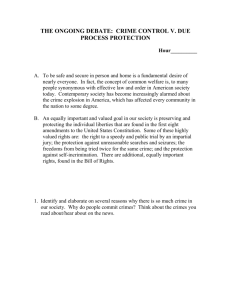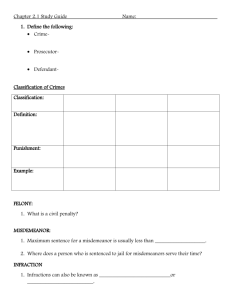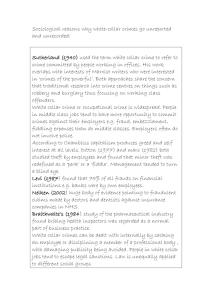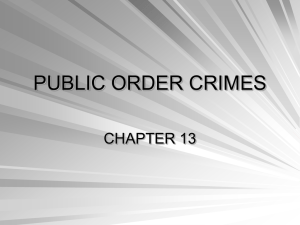Introduction to Criminal Law Almost all crimes require an illegal act
advertisement
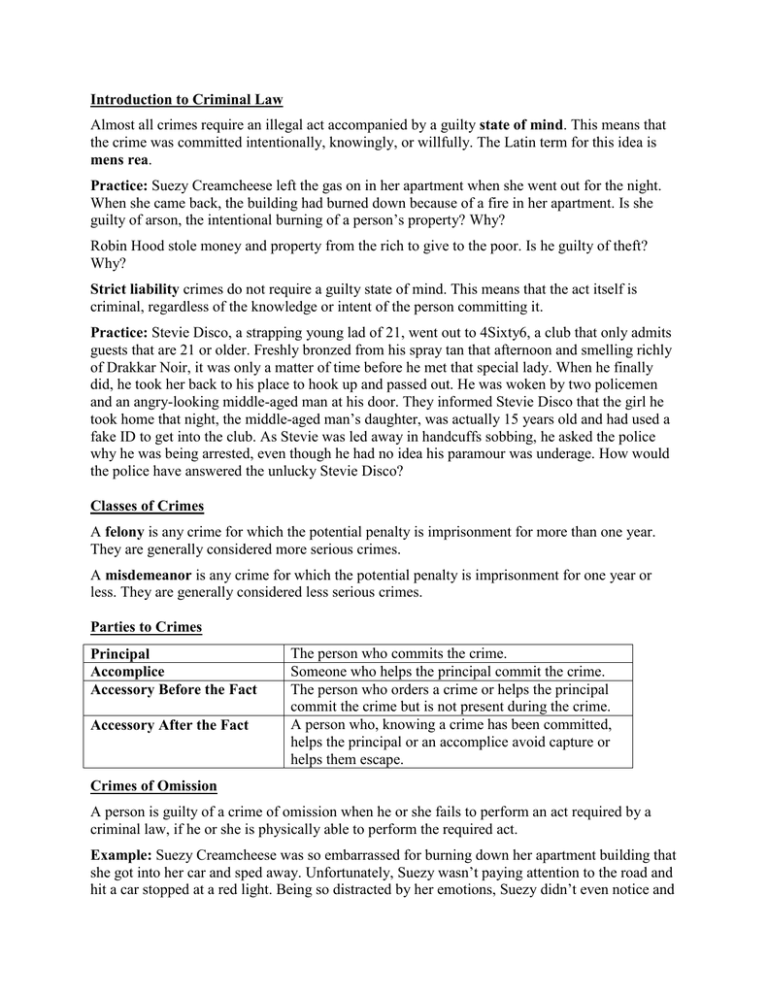
Introduction to Criminal Law Almost all crimes require an illegal act accompanied by a guilty state of mind. This means that the crime was committed intentionally, knowingly, or willfully. The Latin term for this idea is mens rea. Practice: Suezy Creamcheese left the gas on in her apartment when she went out for the night. When she came back, the building had burned down because of a fire in her apartment. Is she guilty of arson, the intentional burning of a person’s property? Why? Robin Hood stole money and property from the rich to give to the poor. Is he guilty of theft? Why? Strict liability crimes do not require a guilty state of mind. This means that the act itself is criminal, regardless of the knowledge or intent of the person committing it. Practice: Stevie Disco, a strapping young lad of 21, went out to 4Sixty6, a club that only admits guests that are 21 or older. Freshly bronzed from his spray tan that afternoon and smelling richly of Drakkar Noir, it was only a matter of time before he met that special lady. When he finally did, he took her back to his place to hook up and passed out. He was woken by two policemen and an angry-looking middle-aged man at his door. They informed Stevie Disco that the girl he took home that night, the middle-aged man’s daughter, was actually 15 years old and had used a fake ID to get into the club. As Stevie was led away in handcuffs sobbing, he asked the police why he was being arrested, even though he had no idea his paramour was underage. How would the police have answered the unlucky Stevie Disco? Classes of Crimes A felony is any crime for which the potential penalty is imprisonment for more than one year. They are generally considered more serious crimes. A misdemeanor is any crime for which the potential penalty is imprisonment for one year or less. They are generally considered less serious crimes. Parties to Crimes Principal Accomplice Accessory Before the Fact Accessory After the Fact The person who commits the crime. Someone who helps the principal commit the crime. The person who orders a crime or helps the principal commit the crime but is not present during the crime. A person who, knowing a crime has been committed, helps the principal or an accomplice avoid capture or helps them escape. Crimes of Omission A person is guilty of a crime of omission when he or she fails to perform an act required by a criminal law, if he or she is physically able to perform the required act. Example: Suezy Creamcheese was so embarrassed for burning down her apartment building that she got into her car and sped away. Unfortunately, Suezy wasn’t paying attention to the road and hit a car stopped at a red light. Being so distracted by her emotions, Suezy didn’t even notice and kept on driving. The driver whom Suezy hit wrote down the license plate number and reported her to the police. When she was finally pulled over by the police, Suezy, crying, tried to explain that she would have stopped under normal circumstances. The policeman explained that Suezy was under arrest for hit and run anyway. Why? Preliminary Crimes Preliminary crimes take place before or in preparation for committing a crime and require proof of criminal intent but can be punished even if the harm intended never occurred. The three types of preliminary crimes are: Preliminary Crime Solicitation Definition Asking, commanding, urging, or advising someone to commit a crime. Attempt When someone performs all of the elements of a crime but fails to achieve the intended result. Conspiracy An agreement between two or more persons to commit a crime, combined with an intent to commit the crime and some action that furthers the agreement. Example Stevie Disco eventually married Suezy Creamcheese (Suezy kept her name), but he got tired of her very quickly. Stevie wanted to kill Suezy but didn’t have the nerve to do it, so he asked his friend Johnny Jabip to do it for him. Johnny wanted more money to kill Suezy than Stevie had, so Stevie got a crew together to rob the bank in town. They made it up to the front counter with their guns and masks, but there was a group of police officers across the street who saw them enter. Stevie and his crew were arrested before they could steal a single dollar from the bank. When the police searched Stevie’s house, they saw he and his crew had a handwritten list of banks in the area and a map with multiple “X” marks on it. It was clear the Xs stood for the other banks. There was also a closet full of additional guns and ammunition.



